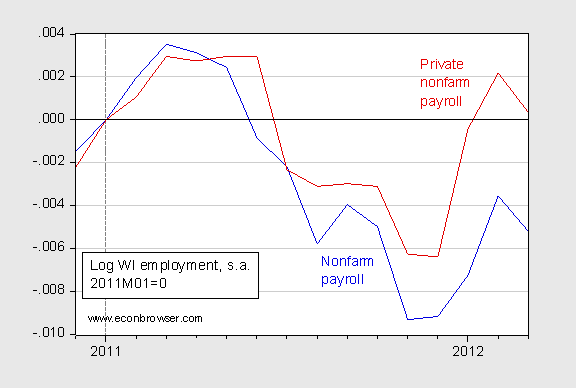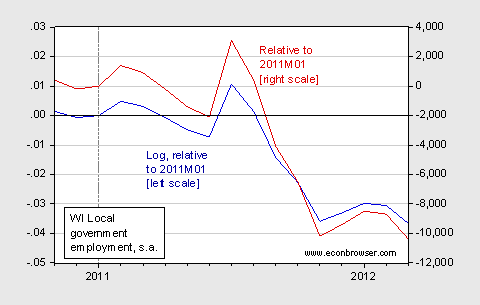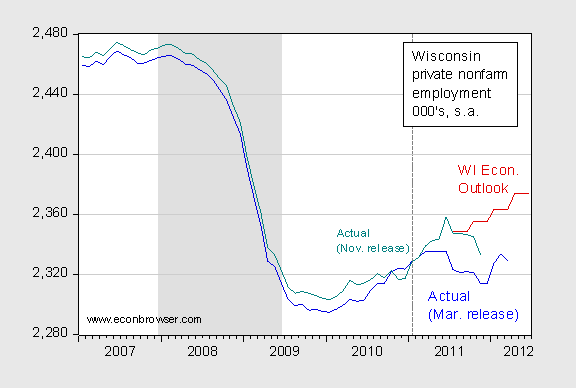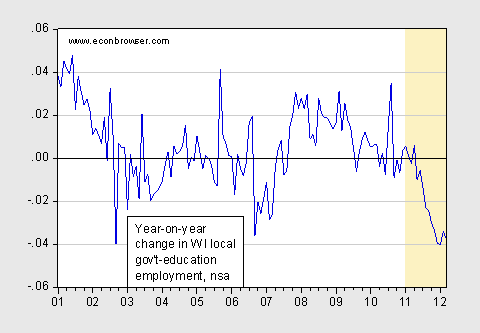From WisPolitics today:
Walker warned that job losses might again ramp up in Wisconsin if either Barrett or Falk are elected in the June 5 recall…
My observation is that we don’t need to wait to June 5 to see if job losses will occur. Nonfarm payroll jobs disappeared in March, after a brief respite in January and February. Further, Wisconsin had the only significant job loss in the nation over the past year.

Figure 2: Log Wisconsin nonfarm payroll employment (blue) and Wisconsin private nonfarm payroll employment (red), relative to January 2011. Vertical dashed line at 2011M01. Source: BLS and author’s calculations.
Wisconsin’s lackluster performance since 2011M01 is discussed further in this post. (Tim Duy reminds me that the accuracy of state establishment series has decline recently, so one has to be cautious about over-interpreting recent trends; nonetheless all employment indicators put Wisconsin in a poor light relative to the US overall, including civilian employment.)
Note the divergence in private and total nonfarm payroll employment. This occurs because government (primarily local) employment has been reduced.

Figure 2: Log WI local government employment relative to 2011M01 (blue, left scale), and employment relative to 2011M01 (red, right scale). Source: WI DWD and author’s calculations.
Teacher employment is one category that has fallen substantially [1]. In other news, the Walker Administration is planning to award $765 thousand in bonuses to selected government workers in a newly initiated program. [2]
I will venture to say that we should not put too much credence in Governor Walker’s forecasts, given his previous record of employment forecasts, including the 250,000 jobs to be created.[3]

Figure 3: Wisconsin private nonfarm payroll employment from BLS March 2012 release (blue), from BLS November 2011 release (teal), and projections from Wisconsin Economic Outlook (October 2011) (red), in 000’s. NBER defined recession dates shaded gray. Vertical line at 2011M01. Sources: BLS, Wisconsin Economic Outlook and NBER.
Update 1 May, 11am Pacific: Here is additional data on year-on-year change (in log differences, so interpretable as annual growth rates) in employment in local education.

Figure 4: WI local government employment in education, not seasonally adjusted, 12-month log difference (blue, left scale). Tan shaded area corresponds to period after 2011M01. Source: WI DWD and author’s calculations.
Walker is working. The job losses are all caused by a dirty lib plot.
Menzie,
I just want to make sure that I understand your graphs. DEMOCRAT Jim Doyle was elected in took office in January 2003 and left in January 2011. Your only graph that covers a portion of this time is not really encouraging. Now Scott Walker has been in office almost 1 1/2 years and the bleeding has stopped and that is bad?
Menzie wrote:
…the Walker Administration is planning to award $765 thousand in bonuses to selected government workers in a newly initiated program.
Did you read the article in your link? Any bonuses must come from existing budgets.
I realize that you have not worked in the real economy and you view the economy in aggregate from 10,000 ft, but real workers respond to incentives. That means that if you have a worker who will do twice the work of other workers and you compensate that person 10% more you can actually save in the process. This reduces cost and allows you to reduce your budget.
Sorry, I know this will be a little difficult for you to grasp because I did not reduce it to a formula.
Looks like a nontraditional form of crowding out occurring around world. Government borrowing isn’t leading to higher borrowing rates outside the public sector, in the sense of traditional crowding out. However, government itself appears to be rationing government services rather than continue to borrow along the old trajectory.
the report on teacher employment is confusing. in one section it notes that “This represents a 2.4 percent loss in full-time equivalent (FTE) teaching staff at a time when student enrollment is stable.”
while in another section it notes “Statewide, declining enrollment slowed this year, though individual districts may have experienced differing changes in year-to-year enrollments. For each of the past two school years, staffing cuts were between 1,400 and 1,500 positions per year statewide, compared to 2,312 for the current year. For the 2011-12 school year, 315 of 424 school districts, or 74 percent of districts, cut staff. Of the districts that increased staffing, more than half reported increased enrollment.”
a little confusing: did enrollment decline or not overall (seems like it did decline, but not by as much as the teacher cuts), what was the percentage?
Ricardo said Any bonuses must come from existing budgets..
And those bonuses did. They came from the salaries of employees that were laid off. And they went to employees that were making over $120k/yr., like the assistant attorney general. That’s one way to motivate your government workforce, I guess. Maybe they can get her to do twice the work of one of the laid off teachers.
I’d be curious about your take on this analysis of raw BLS job numbers that’s floating around Wisconsin blogs.
http://www.timnerenz.com/2012/04/wiscosin-gets-jobbed.html
Excerpt:
gridlock,
I know that it is difficult to read every post on the site so let me repeat something I posed earlier.
You need to dig a little deeper. Even with (and perhaps to an extent because of) the bonuses the total Wisconsin budget has been cut, but those cuts have not caused teacher layoffs. Teacher layoffs were avoided because the Walker government allowed school districts to bid for health insurance rather than being forced to choose the overpriced union insurance. School districts that were planning to layoff teachers not only retained the teachers but are realizing a surplus.
Anon: Well, reading the post, I said “well, duh”. He chose the household series, the articles he was focused on cited the establishment series. This diffferentiation is known to pretty much anybody who reads Econbrowser with any regularity. He’s free to chose which series he wants, but not to get so exercised about it (unless he wants to highlight his ignorance).
I will venture to say that we should not put too much credence in Governor Walker’s forecasts, given his previous record of employment forecasts, including the 250,000 jobs to be created.
Funny how Menzie would never apply this same standard against Obama’s wildly optimistic estimates for the nation, which have been wrong by a much greater margin.
Menzie,
You forgot to mention that it looks like Sen. Jauch (D) Poplar. WI is about to be recalled. Current petitions pending, of course. All over WI, People are holding their powder on jobs creation, because the Dems have been more interested in destroying Walker then creating jobs. Jauch is being recalled for stopping the development of 5000 construction and 2800 permanent jobs, average wage of $65,000, in northern WI. Of course, he also ran to Illinois, when the going got tough. These were mining jobs and there was no compelling reason, not even the environment per WI DNR, to not go forward. Walker has been working for over a year to put together a $100,000,000 re-investment plan into the worst areas of Milwaukee. I’d say as soon as Walker wins in June, the State will explode with job creation. If for any reason, Walker should lose, it doesn’t look good for the Union/Dem/Progressive folks, but then they do know how to win through fraud, you will see a collapse of WI ecnonmy as the best and brightest will continue their decades long expatriation from WI.
Darren Job growth has certainly been weak, but as a statement of fact job growth has actually tracked pretty closely with what Obama promised. Total employment bottomed out in Feb 2010 at 129.2 million. Obama said that ARRA would create about 3 million jobs. Today total employment is at 132.8 million. Job growth is even better if you only look at private sector employment, so in this sense Gov. Walker is making things worse, not better. The problem with Obama’s numbers isn’t that he didn’t deliver the promised number of jobs (he did); the problem is that Obama’s promise wasn’t bold enough. And that’s because ARRA wasn’t bold enough. Instead of $710B we needed twice that amount. And that’s because Obama was naive in believing the GOP wanted to act like constructive partners.
Ricardo Whether or not Wisconsin’s budget was a mess when Gov. Walker took office is not a reason for taking the actions he took. The time to straighten out structural deficit problems is when the economy is on the mend, not when it’s stuck in recession. Your Arthur Laffer talking points are a joke and simply reinforce the point that you (and Laffer) do not have a clue about responsible fiscal policy. There is nothing responsible about running a surplus during a recession. Walker’s policies are penny wise and pound foolish.
I just read that the city of Providence, RI is turning to non-profits to fund the city’s pension short-fall. That made me think that the best way to cover the government employee union short-fall in Wisconsin is for non-profits and state institutions like the University of Wisconsin to pay its fare share of property taxes. Just how much does the University of Wisconsin pay in property taxes anyway?
The 12-month net change of the QCEW shows +38,707 in Jan. 2011, +26,699 in Jun. 2011, and +36,561 in Sept. 2011. However, the CES establishment survey’s 12-month net change for those same months is +32,300, +21,000, and +4,100. The reason why Jan. and Jun. 2011 for the QCEW and CES employment are relatively similar is because CES benchmarked the 2011 employment to the QCEW up to the 2nd quarter. As you can see, the CES data is getting very off track (36,561 vs. 4,100) just 3 months after the benchmarked 2nd quarter.
If we look further at the 3rd quarter QCEW employment, we see that from July to September employment increases by +32,878. CES employment over the same period declines by -9,900. CES employment will eventually be benchmarked to the QCEW numbers and the decline in the CES employment will be transformed into an increase in employment. So, the CES establishment jobs losses will turn out to be not losses at all but job gains.
CES employment in the 4th quarter continues the non-existent 3rd quarter decline. We will know soon enough whether the 4th quarter decline in CES employment is as illusory as the 3rd quarter decline.
So, it does after all look like we will have to wait well past June 5th to find out if job losses really occurred or not.
To make a point I’ve made before: the Wisconsin experience actually shows the outcomes from these policy changes are minor. They certainly haven’t been good, whether compared to promises made by Gov. Walker or to the experiences of other states. Remember, nearly every state – including most resource rich ones – has had a budget crisis. Some responded with this kind of radical action and others did it differently. That functions as a test of the proposition that this kind of radical approach has inherent benefits. There is no evidence of that. States which have done things differently are recovering better and have made as much or more progress in changing their finances.
It amuses me we play these relative games. We can’t accept reality when it confronts our ideology.
Slug wrote:
There is nothing responsible about running a surplus during a recession.
Slug,
Amazingly on this you and I agree, but I would take it further. There is nothing responsible about EVER running a surplus. If the government runs a surplus by definition the private sector runs a deficit. That means resources have been taken from the wealth producers and left idle.
I know as a Keynesian you want to save up for a rainy day but there are two problems with that. First, you reduce wealth production, but probably more disasterous is that Keynesians can’t tell the difference between good times and bad times (as can be seen from the fact that when they are in power there is never a surplus – please don’t throw up the Bill Clinton years. Clinton governed more on supply theory that GW Bush and he also has a Republican congress. That dog don’t hunt!). For Keynesians we are always in bad time.
Slug wrote:
The time to straighten out structural deficit problems is when the economy is on the mend, not when it’s stuck in recession.
I am sure when you wrote this you had your tongue firmly planted in your cheek. How can you say this and then support driving our country into the greatest debt in history under the guise of stimulus? Why is diving farther and farther into massive debt right when the economy is stuck in recession but correcting structural deficit problems is not? Because you do not understand that consumption is simply the flip side of production you develop programs to consume the seed corn.
Here’s the template for solving state budget problems in world ruled by Progressives:
WWCD – What Would California Do?
Govern with a virtual one party system.
Tax the rich and middle class until they flee the state.
Impose new environmental regulations and increase the cost of doing business in order to drive existing businesses out of state and discourage new businesses from moving into the state.
Force farmers into poverty to protect an endangered minnow.
Wait for a bailout from the U.S. Federal government.
Rinse and repeat unitl a utopian state is acheived.
Ricardo First, you reduce wealth production, but probably more disasterous is that Keynesians can’t tell the difference between good times and bad times
Both statements are wrong. Government provides goods and services that add value. Roads and bridges add value. A court system adds value. Maintaining parks and wildlife refuge adds value. Funding basic research adds value. Defense adds value. Fighting terrorists adds value. And Keynesians do know the difference between good and bad times. You move away from fiscal policies when the Fed is able to manage aggregate demand through monetary operations. You throtte back on aggregate demand when the economy breaches the NAIRU. It’s not that hard.
driving our country into the greatest debt in history under the guise of stimulus?
Here you not only flunked history, but you flunked arithmetic. The debt as a percent of GDP has been higher than this before. So much for your history. And the stimulus was only $710B spread out over 3 years. Most…WAY MOST of the deficit is due to Bush’s tax cuts and his wars, not Obama’s stimulus.
Why is diving farther and farther into massive debt right when the economy is stuck in recession but correcting structural deficit problems is not?
Because trying to address a structural deficit problem during a recession only makes the structural deficit worse. That’s what Britain is finding out. That’s what much of Europe recently found out. That’s what we learned in the 1930s.
you do not understand that consumption is simply the flip side of production you develop programs to consume the seed corn.
And by the same logic you should understand that cutting consumption hurts production. I agree that we’re eating our seed corn. That’s what happens when productive capacity sits idle because of weak private sector demand. Households and businesses are deleveraging, which means they have to cut back on consumption. In response businesses cut back on hiring and investment. That causes households to become even more anxious about future job prospects, so they deleverage even more. It’s a vicious cycle. Government spending increases aggregate demand and puts people back to work and breaks the vicious cycle.
please don’t throw up the Bill Clinton years. Clinton governed more on supply theory that GW Bush and he also has a Republican congress.
More bad history. Check the facts. The big spending cuts in government expenditures and investment, Table 3.9.1, happened during the first two years of the Clinton years before the GOP took over in 1995. After the GOP took over federal government spending actually started to increase, eventually taking back half of the savings that Clinton pushed through during his first two years. And that’s just on the spending side. Clinton also pushed through a big tax hike that cost the Democrats control of Congress. Are you saying that Clinton’s tax hikes were part of a supply side strategy? You need to actually look up facts instead of memorizing lies from the WSJ op-ed page.
tj You forgot to mention that back in the late 70s hard right conservatives pushed through Proposition 13. This effectively put California in the position of having to tax income disproportionately rather than wealth. Opponents of Prop 13 warned that this would happen. Supporters of Prop 13 rolled out their favorite “starve the beast” argument.
You also forgot to mention that not imposing environmental regulations also increases costs. Just closing your eyes and pretending that you don’t see a cost just because there isn’t an explicit tax doesn’t mean there isn’t a cost.
A better question is WWMD – What Would Mississippi Do? Now there’s a conservative’s paradise. My friends in Alabama have a saying whenever people tease them about AL being near the bottom on just about everything: “Thank God for Mississippi.”
2slugs,
prop13 – so you favor taxing seniors out of their home?
Enviro costs – At what point does the cost of the reguluation exceed the cost to the environment? Theory is great until a farmer loses his farm to save a minnow.
Mississipppi? Really? You compare the once great state of California to Mississippi?
If California doesn’t make it obvious to you what happens when Progressive ideals are broadly integrated into public policy, then I give up.
How can anybody justify Walker’s term in office as responsible? In Milwaukee County 400 more teachers are being let go over the budget. If it happened in Waukesha County, Walker would already be out of office. No parent should wish to see 60 plus students in any classroom.
Just because Mr. Walker is uneducated, does not mean the state should attempt to leave every child ignorant and uneducated. Mr. Walker has done NOTHING beneficial for the state. Where is his GAAP accounting? Where are the 200,000 jobs he promised? Where is the democratic obstructionism?
There has not been democratic obstructionism! There can’t be when the republicans controlled all offices. Walker is responsible for the state’s failuressince June of last year. And his failures are legion.